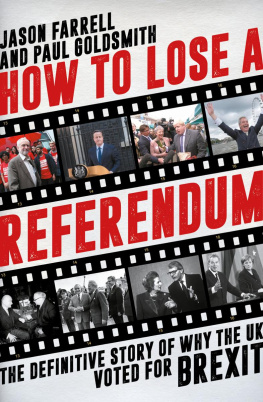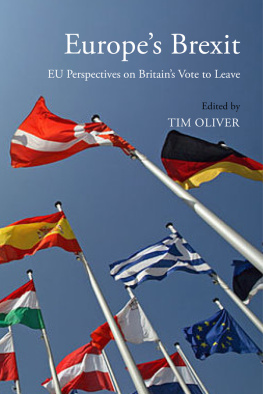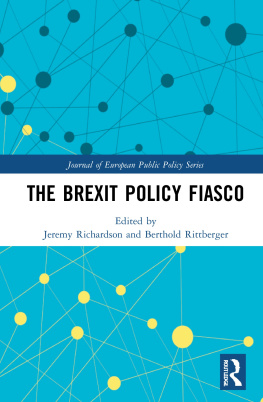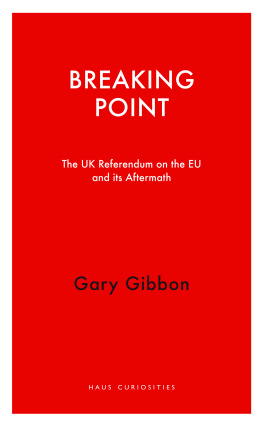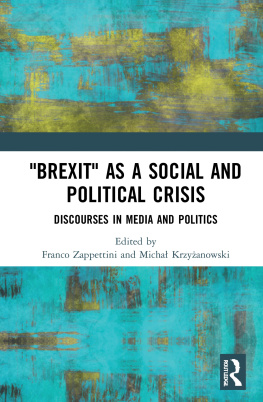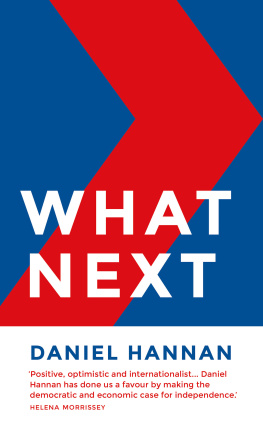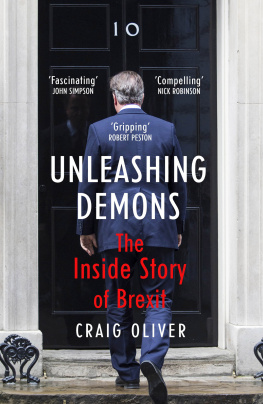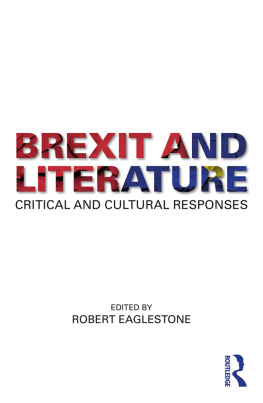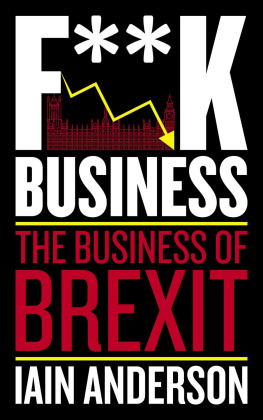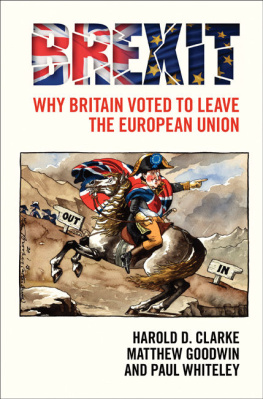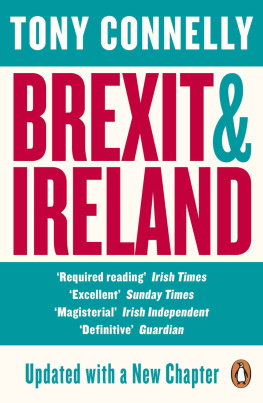Farrell Jason - How to lose a referendum: the definitive story of why the UK voted for Brexit
Here you can read online Farrell Jason - How to lose a referendum: the definitive story of why the UK voted for Brexit full text of the book (entire story) in english for free. Download pdf and epub, get meaning, cover and reviews about this ebook. City: Great Britain, year: 2017, publisher: Biteback Publishing, genre: Politics. Description of the work, (preface) as well as reviews are available. Best literature library LitArk.com created for fans of good reading and offers a wide selection of genres:
Romance novel
Science fiction
Adventure
Detective
Science
History
Home and family
Prose
Art
Politics
Computer
Non-fiction
Religion
Business
Children
Humor
Choose a favorite category and find really read worthwhile books. Enjoy immersion in the world of imagination, feel the emotions of the characters or learn something new for yourself, make an fascinating discovery.
- Book:How to lose a referendum: the definitive story of why the UK voted for Brexit
- Author:
- Publisher:Biteback Publishing
- Genre:
- Year:2017
- City:Great Britain
- Rating:3 / 5
- Favourites:Add to favourites
- Your mark:
- 60
- 1
- 2
- 3
- 4
- 5
How to lose a referendum: the definitive story of why the UK voted for Brexit: summary, description and annotation
We offer to read an annotation, description, summary or preface (depends on what the author of the book "How to lose a referendum: the definitive story of why the UK voted for Brexit" wrote himself). If you haven't found the necessary information about the book — write in the comments, we will try to find it.
Farrell Jason: author's other books
Who wrote How to lose a referendum: the definitive story of why the UK voted for Brexit? Find out the surname, the name of the author of the book and a list of all author's works by series.
How to lose a referendum: the definitive story of why the UK voted for Brexit — read online for free the complete book (whole text) full work
Below is the text of the book, divided by pages. System saving the place of the last page read, allows you to conveniently read the book "How to lose a referendum: the definitive story of why the UK voted for Brexit" online for free, without having to search again every time where you left off. Put a bookmark, and you can go to the page where you finished reading at any time.
Font size:
Interval:
Bookmark:
This book is for Kerrie, Charlie, Millie, Emily, Ellie and Josh
Our book widows and orphans
We hope this is worth it.
This book is also for everybody who would like to know, or think they already know Why Britain voted to leave the EU.
A t 3 a.m. on 24 June 2016, business behind the bar of the ground floor caf in Millbank Tower was swell. For the revellers, the night was still young. The drink was still flowing, the chatter decibel level still rising and, on the fake grass lawn outside, cigarettes still needed to be smoked. Indeed, the high proportion of smokers and the density of purple and tweed combined with the odd 1940s trilby hat made the whole event unmistakably UKIP. If youre a non-smoker in UKIP, youre going to miss half the meetings.
For the numerous broadcast journalists at the event, it was the crossover hour; several were coming to the end of a rollercoaster all-night shift reporting for special programmes as the results of the counts dripped in. Other journalists, including co-author Jason, had stolen a few hours sleep in nearby hotels and were preparing for the six oclock breakfast shows, getting ready to break the result of the EU referendum to the waking world, and embarking on what would become the most momentous and unforgettable day in modern British politics.
The reason so many journalists had come to the Leave.EU event a factional Out campaign group closely affiliated to UKIP was because the official Out campaign, Vote Leave, had cancelled their party. It was widely thought they came to this decision because they assumed they were going to lose. But was it actually because they feared how things would look if they won? How would Conservative voters feel about images of Conservative bigwigs such as Michael Gove and Boris Johnson toasting a victory that would almost certainly lead to their party leader and Prime Ministers resignation? And so, if the UK did decide to leave the EU that night, it would be UKIP purple and tweed that the world would see basking in the glory of victory.
The only person missing from the picture was Nigel Farage. It was not like the party leader to miss a party. Just five hours before he had practically conceded defeat in the EU referendum. But as the pendulum seemed to be swinging back the other way, Farage was having a quiet moment of reflection, having slipped away from the throng to the nearby home of his strategist Chris Bruni-Lowe.
When the polling stations closed at 10 p.m. and the TV channels began their night-long shows, a YouGov survey predicted the result at 52:48 per cent to Remain. Ipsos MORI had the gap slightly wider at 54:46 per cent. According to insiders in Downing Street, the Prime Minister had been certain his side would win with a margin of around eight or nine points. Bookies agreed; earlier in the day they had suggested over a 90 per cent chance of the UK voting to remain in the EU.
The only person who had any figures suggesting anything different was the organiser of the Leave.EU event in Millbank Tower. The UKIP donor Arron Banks had conducted a secret poll of 10,000 people that suggested the opposite to YouGov: that the UK would vote to leave by 52:48. Hed first seen the figures at around lunchtime and shared them with Farage, telling him to stop bloody worrying. His poll had done something the others hadnt. It had actively dug into the cohort of people who didnt usually vote, and discovered that this time they had and these non-voters were voting to leave.
As the party bustled around him through the long night, Bankss figures started to be confirmed. First, at midnight, Newcastle upon Tyne only narrowly voted to remain. The expectation had been that the city was more strongly in favour of EU membership. Then Sunderland went 61 per cent Leave. A Leave vote had been expected, but not by as wide a margin. Pollsters tapped these new findings into their laptops to reconfigure their predictions and suddenly they were getting the kind of results Banks had seen fourteen hours earlier. Currency traders began to press the sell button on their holdings in sterling. Arron Banks quietly watched everything unfolding as hed expected.
As the Sunderland result came, Brexit campaigner and soon-to-be Brexit Minister David Davis was on the BBCs election programme. In an off-air aside, the perennial presenter of BBC election shows David Dimbleby leant across and said, You could win this. Davis replied, We just have. He had looked up at the overall count and could see that so far nationwide a million votes had been counted, bigger than any poll and Leave were in front.
In the offices of Stronger In, the official designated Remain campaign, they were using special demographic-based software developed by Jim Messina, the former White House deputy of staff under President Obama and specialist in highly developed digital techniques for targeting individual voters. Messina had helped the Tories win the general election in May 2015, and reluctantly George Osborne had agreed to allow the cross-party Remain group to use some of his alchemy for their campaign. The Messina software worked out what each location in the UK should score if the result was going to be a 50:50 split. A team based in Downing Street and another in Labour HQ tapped the initial results into the model then conferred with the press team at the Stronger In office, which was headed up by Nick Cleggs former campaign manager James McGrory.
McGrory, who was Stronger Ins head of media, would interpret the results into lines that could be spun out by partygoers at their media event in the Royal Festival Hall on the South Bank. The Sunderland and Newcastle results had been disappointing but not disastrous, only 1 or 2 per cent lower than where they should have been on the 50:50 split, so pretty much in the rough margins of what was expected.
The problem for McGrory was that as the night wore on, the 1 or 2 per cent below expectation was becoming a pattern. Consistently, both in areas where they won and in those where they lost, they were just below where they should have been 59 per cent where it should have been 60 per cent, or 44 per cent instead of 46 per cent.
At 1 a.m. the swing seat of Swindon went nine points for Leave, then more Labour heartlands declared for Brexit: Tyneside, Swansea, Middlesbrough, Hartlepool, Bury, Redcar and Cleveland. By 2.30 a.m., a Remain vote from Glasgow only offered light relief to the Stronger In campaign: it was a low turnout in the city that in 2014 had voted avidly for the break-up of the United Kingdom.
They were falling behind the curve, but McGrory wasnt going to accept defeat yet: he was also hearing that Remain had piled up massive votes in London, and a couple of strong areas had come in way over the expected threshold. He wasnt prepared to write it off, even though the Messina software was now giving his team exactly the same figure Arron Banks had 52 per cent Out.
Arron Banks stood with a broad smile but with apparent sobriety compared to the ever more red-faced frivolity around him. The question now was whether Scotland, London and other big pro-EU cities such as Liverpool and Manchester could hold out in large enough numbers to sway the outcome. But as London suburbs such as Watford came out for Leave, it countered the anticipated strong Remain votes coming from inner-city places like Hammersmith and Wandsworth.
At this point Banks began to suggest to the circles around him that his figures had been bang on the UK was going to leave the EU. Shortly afterwards he was saying the same to journalists.
Word spread that Nigel Farage himself was about to rejoin the party. Excited chatter filled the room, only offset by the serious tone blaring out of the two wall-hung TV sets, which occasionally sucked all the noise out of the room. It happened again at 3.20 a.m., a hush for the announcement from Coventry. The bellwether city voted 67,967 Remain; 85,097 Leave. There was a roar of delight from the sixty or so partygoers. Cameras flashed, reporters prodded microphones into the excited crowd and suddenly the scene in the room was replicated on the two TV sets. I cant believe it, said someone. We are going to win! His words echoed back to him from the wall screens.
Font size:
Interval:
Bookmark:
Similar books «How to lose a referendum: the definitive story of why the UK voted for Brexit»
Look at similar books to How to lose a referendum: the definitive story of why the UK voted for Brexit. We have selected literature similar in name and meaning in the hope of providing readers with more options to find new, interesting, not yet read works.
Discussion, reviews of the book How to lose a referendum: the definitive story of why the UK voted for Brexit and just readers' own opinions. Leave your comments, write what you think about the work, its meaning or the main characters. Specify what exactly you liked and what you didn't like, and why you think so.

